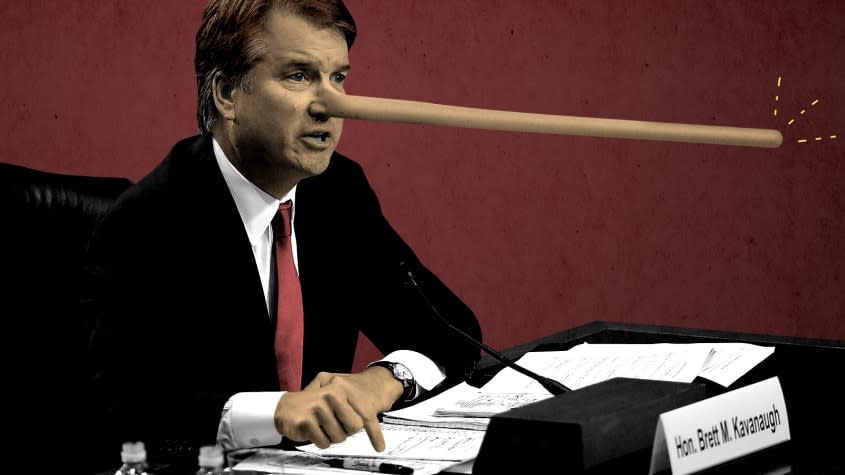Did SCOTUS judges lie about Roe v. Wade — or just use 'careful lawyerly phrasing'?

Sen. Susan Collins (R-Maine) said after the Supreme Court overturned Roe v. Wade last week that, as a nominee, Justice Brett Kavanaugh had assured that he wouldn't vote to overturn the landmark decision that had protected abortion rights for 50 years. Collins said Kavanaugh insisted he was not a threat to Roe, saying, "I am a don't-rock-the-boat kind of judge." Sen. Joe Manchin (D-W.V.) said after the ruling that Kavanaugh and Justice Neil Gorsuch both gave misleading statements under oath during their confirmation hearings, emphasizing that the landmark decision was established law under "stare decisis," the legal principle of following precedents — particularly those that have been reaffirmed in subsequent decisions, as Roe had.
In a closely divided Senate, the votes of Collins, a moderate Republican, and Manchin, a moderate Democrat, were critical in the 50-48 July 2018 vote to confirm Kavanaugh. Rep. Alexandra Ocasio-Cortez (D-N.Y.) said that if Kavanaugh and other new justices lied about their intentions on Roe — under oath — to win confirmation, lawmakers should "seriously" consider impeaching them. Dan Urman, director of the Law and Public Policy Minor at Northeastern, said nothing the justices said amounted to perjury, and, if anything, their "careful lawyerly phrasing" suggested they "were prepared to overturn Roe." "If they were not, then they could have given a more direct and less careful answer," Urman says in News@Northeastern. Did the justices join the court planning to overturn Roe, and lie about it?
The Justices didn't lie
Justices Kavanaugh and Gorsuch didn't lie during their confirmation hearings, says The Wall Street Journal in an editorial, and "we'd be stunned if either Justice came close to making a pledge about Roe" in their private meetings with Collins and Manchin. "The reason is that the first rule of judging is that you can't pre-judge a case." The late progressive icon Justice Ruth Bader Ginsburg herself said in 1993 that justices "sworn to decide impartially can offer no forecasts" on how they'll rule on any matter, because to do so "would display disdain for the entire judicial process." Judge Ketanji Brown Jackson, the recently confirmed liberal newcomer to the high court, dodged direct answers about precedent in the same way. She would probably "vote to overturn all of last week's rulings on religious liberty, guns, and abortion if she gets the chance. But that doesn't mean she lied to the Senate."
Of course Kavanaugh lied
You might not think Kavanaugh and Gorsuch lied, says EJ Montini at the Arizona Republic, but the Sisters of St. Joseph, "who so rigorously guided me through parochial grade school," certainly would. During the confirmation process, Kavanaugh and Gorsuch knew exactly what the senators were asking them, and they gave carefully crafted answers that they knew full well would create a false impression about how they'd vote on Roe. The nuns taught us that the Ninth Commandment — "Thou shalt not bear false witness against thy neighbor" — covers every kind of lie or attempt to mislead. "In other words, should you choose to dodge a question in order not to tell the truth … you are, essentially, lying." Maybe the "good sisters" need to update their teaching, because apparently the rule doesn't apply to candidates for the Supreme Court.
Was anybody really fooled?
The justices clearly hid their intentions with carefully scripted legalese, says Matt Ford in The New Republic. But "none of the justices' remarks during those hearings actually appear to be perjurious." Besides, the conservative legal movement spent the last three decades building "social networks and informal screening mechanisms" to guarantee that anyone nominated to the high court by a Republican president "would vote to overturn Roe — and rule in certain ways in other areas of the law — without putting them in thumbscrews or relying on sheer luck." Former President Donald Trump said it out loud in 2016 when he pledged to appoint only "pro-life" judges, openly celebrating what had been an "unstated policy." If all we're going to do in confirmation hearings is ask nominees questions we already know the answers to, and force them to give us dishonest answers, we should scrap the process altogether. If confirmations are just a platform for "justices to mislead lawmakers and the public, then the only reason to hold them is to undermine the courts' legitimacy."
Now Collins needs to prove she's not the one who lied
Americans are split into two camps regarding Collins, says Jennifer Rubin at The Washington Post. One thinks she "practiced willful blindness to rationalize her votes confirming Justices Brett M. Kavanaugh and Neil M. Gorsuch — two of the five Supreme Court justices who last week voted to blow up the basic rights of millions of women by overturning Roe v. Wade." The second group thinks "she was duped." Either way, Roe has been overturned and 50 years of abortion-rights protections are gone. "It is not politically or morally sufficient for Collins or Manchin to simply holler 'I was tricked!' when the rights of millions of Americans are at stake." What matters now is what they do next. If Collins doesn't step up to "fix the damage" caused by her "egregious" error, "voters will draw the conclusion that she wasn't that surprised — or that sorry — that she enabled the destruction of women's fundamental right to reject forced birth."
You may also like
Former Trump aides vouch for credibility of bombshell Jan. 6 witness: 'I don't think she's lying'
SCOTUS backs Oklahoma in case regarding crimes on tribal lands

